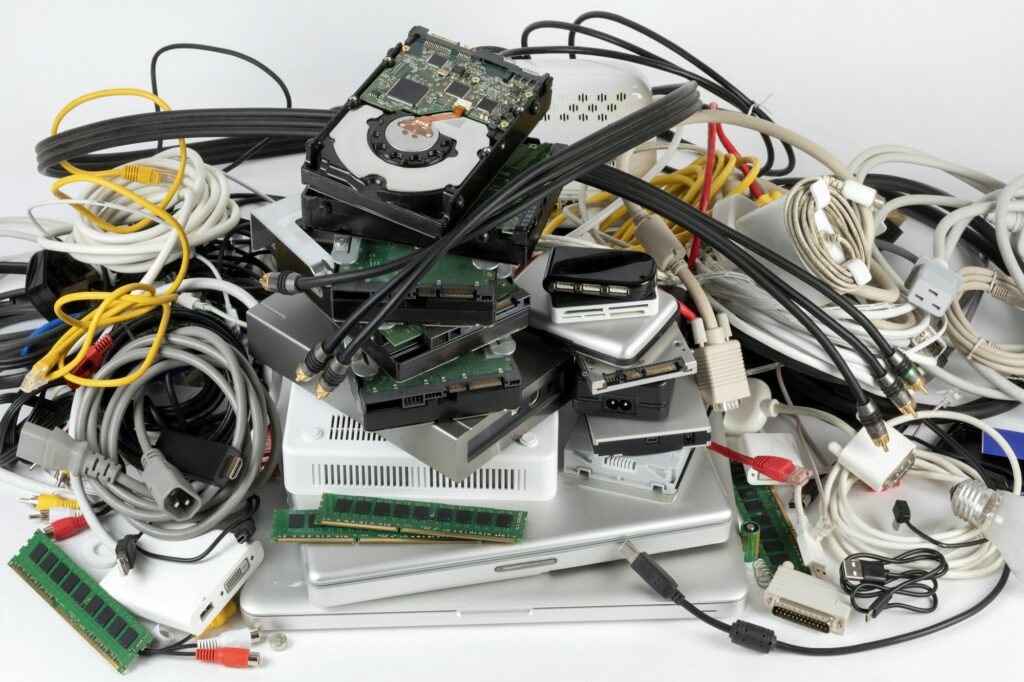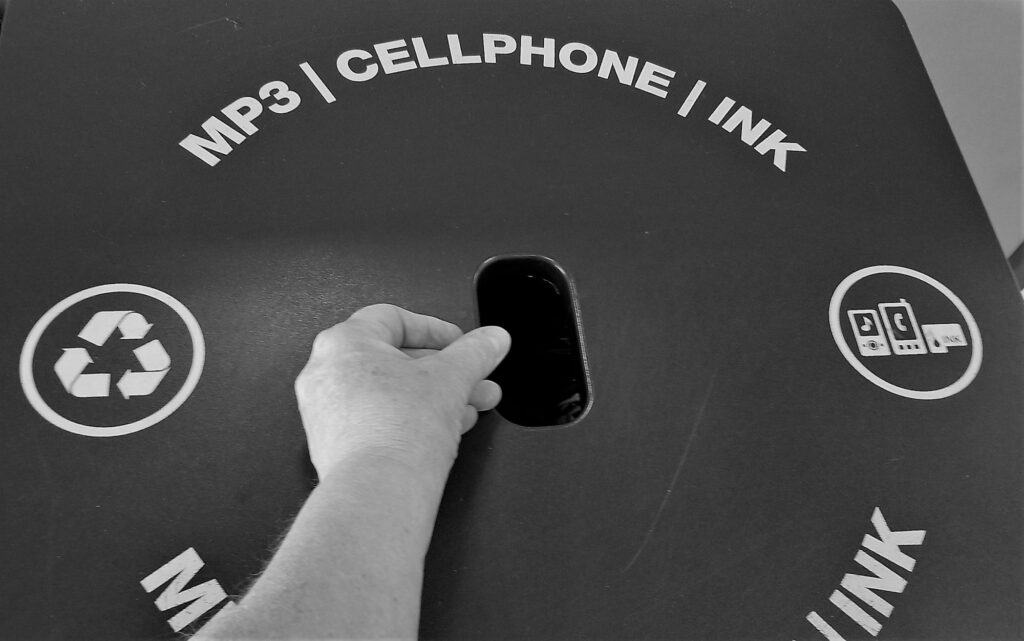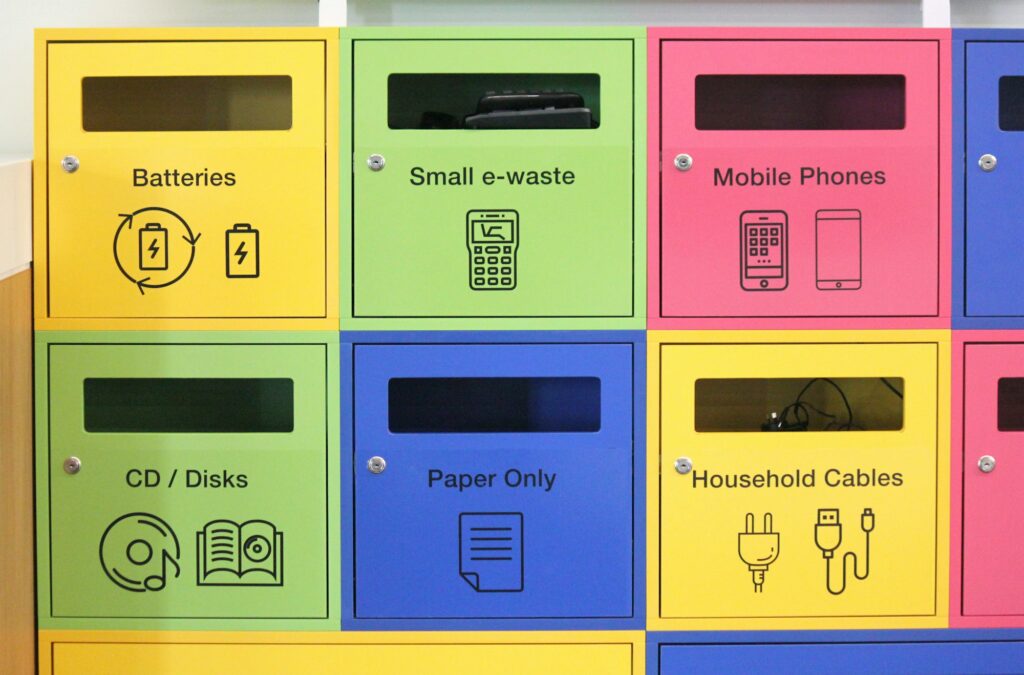You may think that getting rid of your old electronics is as simple as tossing them in the trash, but there are important do’s and don’ts to consider when it comes to electronics recycling. As a junk removal professional with years of experience, I’ve seen firsthand the impact of improper disposal of electronics on the environment. , Let me share some valuable tips on how to responsibly recycle your electronics to protect the planet and comply with regulations.

Key Takeaways:
- Find a certified electronics recycler: It’s crucial to ensure that your electronic waste is handled properly and responsibly. Look for a certified recycler to dispose of your electronics safely.
- Avoid throwing electronics in the trash: Electronics contain hazardous materials that can harm the environment if not disposed of correctly. Never toss electronics in the regular trash.
- Consider donating or recycling old electronics: Instead of letting your old electronics collect dust or end up in a landfill, explore options for donation or recycling to give them a new life and reduce e-waste.
The Global E-Waste Crisis
Magnitude of E-Waste Generation
You may not realize the sheer magnitude of electronic waste, or e-waste, being generated worldwide. With rapid advancements in technology and the ever-increasing demand for the latest gadgets, our old electronics are being discarded at an alarming rate. It is estimated that over 50 million tons of e-waste is produced globally each year, with only a fraction of it being properly recycled or disposed of.
Environmental Impact of Improperly Disposed Electronics
The generation of e-waste is not just a matter of cluttering landfills; it poses a significant threat to the environment and human health. Improper disposal of electronics can lead to the release of harmful chemicals and toxins into our soil, water, and air. These substances can contaminate ecosystems, harm wildlife, and ultimately find their way into our food chain, affecting human health in the long run.
With the rapid pace at which new electronic devices are being introduced and older ones becoming obsolete, the e-waste crisis is only expected to worsen. It is crucial that we take proactive measures to address this growing concern before it spirals out of control.
Health Risks from Electronic Waste
E-waste can pose serious health risks if not handled and disposed of properly. Exposure to toxic materials like lead, mercury, and cadmium, commonly found in electronic devices, can lead to a range of health issues such as respiratory problems, skin disorders, neurological damage, and even certain types of cancers. Informal recycling practices in developing countries often involve open burning of e-waste, releasing toxic fumes into the air and exposing workers to hazardous conditions.
Electronics recycling is not just about decluttering your space; it is a crucial step towards protecting both the environment and human health. By responsibly recycling your old electronics and supporting e-waste management programs, you can play a vital role in combating the global e-waste crisis.
Understanding Electronics Recycling

Once again, it is imperative to understand the importance of electronics recycling in our modern society. As technology continues to advance and electronic devices become a staple in our daily lives, the need for responsible disposal of these items is more critical than ever.
What is Electronics Recycling?
Any electronic device that is no longer being used or has reached the end of its life cycle can be considered electronic waste, or e-waste. Electronics recycling involves the process of collecting, sorting, dismantling, and reusing or disposing of these electronic devices in an environmentally friendly manner. By recycling electronics, valuable materials can be recovered and reused, reducing the strain on natural resources and minimizing the environmental impact of electronic waste.
The Electronics Recycling Process Explained
On a practical level, the electronics recycling process involves several key steps. First, electronic devices are collected from various sources such as individual consumers, businesses, or government agencies. These devices are then sorted into different categories based on their type and condition. Next, the devices are dismantled, and the individual components are sorted for further processing. Finally, the valuable materials such as metals, plastics, and glass are recovered and sent for recycling or reuse.
A crucial aspect of the electronics recycling process is ensuring that hazardous materials such as lead, mercury, and cadmium are safely handled and disposed of. These toxic substances can pose serious health and environmental risks if not properly managed. By following strict guidelines and regulations, electronics recyclers can safely extract valuable materials while minimizing the negative impact on the environment.
Benefits of Proper E-Waste Disposal
Electronics recycling offers a wide range of benefits, both for the environment and society as a whole. By properly disposing of e-waste, we can reduce the amount of electronic waste ending up in landfills, where toxic materials can leach into the soil and water supply. Additionally, recycling electronics helps conserve valuable resources such as metals, plastics, and rare earth elements, which are often used in the production of new electronic devices.
With proper e-waste disposal, we can also prevent air and water pollution caused by improper dumping or incineration of electronic devices. By choosing to recycle our electronics responsibly, we can help create a more sustainable future for generations to come.
Do’s in Electronics Recycling
Identifying Recyclable Electronic Items
Your first step in electronics recycling is to identify which items can be recycled. Any electronic device, such as old laptops, smartphones, printers, and even cables, can typically be recycled. It’s important to check with your local recycling center or e-waste facility to confirm the specific items they accept for recycling.

Preparing Electronics for Recycling
On top of identifying recyclable electronic items, it’s crucial to prepare them properly for recycling. Before dropping off your electronics, make sure to back up any important data and erase all personal information from the devices. This step ensures that your data remains secure and that the devices are ready for recycling.
Avoid throwing electronic items in the trash as they can contain hazardous materials that can harm the environment if not disposed of properly. By following these steps, you can contribute to a cleaner environment and promote responsible recycling practices.
Finding Responsible Recycling Facilities
A crucial aspect of electronic recycling is finding responsible recycling facilities to ensure that your electronic items are recycled in an environmentally friendly manner. The best way to find reputable facilities is by checking for certifications such as R2 or e-Stewards. These certifications indicate that the facility adheres to strict environmental and ethical standards in their recycling practices.
The next time you are looking to recycle your old electronics, remember to research and choose a responsible recycling facility to dispose of your items properly. By doing so, you can help reduce e-waste and minimize the environmental impact of electronic devices.
Electronics contain valuable materials that can be recovered and reused through recycling. By following these do’s in electronics recycling, you can play an imperative role in promoting sustainability and protecting the environment for future generations.
Don’ts in Electronics Recycling
Common Mistakes to Avoid
To ensure that electronics are recycled properly and responsibly, avoid common mistakes such as throwing them in the trash bin or mixing them with regular household waste. Electronics contain hazardous materials that can be harmful to the environment if not disposed of correctly. It is imperative to resist the urge to simply discard old gadgets in the trash and instead take the time to find a reputable electronics recycling facility or collection event.
Understanding What Not to Recycle
Avoid recycling items that are not accepted in electronic recycling programs, such as batteries, toner cartridges, and light bulbs. These items require special handling due to the materials they contain. It is important to separate these items from your electronic waste and dispose of them properly through designated collection points. By understanding what not to recycle, you can prevent contamination of the recycling stream and ensure that hazardous materials are managed appropriately.
Another important aspect to consider is the recycling of old devices like CRT monitors and televisions that contain leaded glass. These items should not be processed in regular electronic recycling facilities due to the specialized techniques required to handle the leaded glass. It is crucial to research and find specialized recyclers or programs that can manage these items safely and efficiently.
Dangerous Practices in E-Waste Disposal
An alarming and dangerous practice in e-waste disposal is burning electronic devices to extract valuable metals. This not only releases harmful toxins into the air but also endangers human health and the environment. It is crucial to never attempt to extract metals from electronics through burning or other hazardous methods. Such practices can have severe consequences and should be avoided at all costs.
Mistakes in e-waste disposal can have long-lasting impacts on our health and the environment. By understanding the don’ts in electronics recycling and avoiding common pitfalls, we can contribute to a sustainable and responsible approach to managing electronic waste.
The Role of Junk Removal Professionals
Many people may not realize the important role that junk removal professionals play in the process of electronics recycling. These experts are trained to safely and efficiently remove electronic waste from homes, businesses, and other locations. By entrusting this task to junk removal professionals, individuals can ensure that their electronic items are disposed of properly and do not end up in landfills where they can harm the environment.
Services Provided by Junk Removal Experts
To help individuals and businesses properly dispose of their electronic waste, junk removal professionals like R&R Clean Up offer a range of services. This includes picking up old electronics from a location, sorting and categorizing the items, and then transporting them to certified recycling facilities. By utilizing the services of these experts, individuals can save time and effort in trying to dispose of electronic waste on their own.
Contributions to Sustainable Electronics Recycling
By ensuring that electronic waste is handled and processed correctly, these experts help prevent harmful chemicals and toxins from entering the environment. Additionally, by promoting the reuse and recycling of electronic items, junk removal professionals play a vital role in conserving natural resources and reducing the carbon footprint associated with electronic waste disposal.
Their efforts not only help protect the environment but also support the growth of the recycling industry, creating opportunities for innovation and advancements in sustainable waste management practices.
State and Federal E-Waste Regulations
An Overview of E-Waste Legislation
Federal and state governments have recognized the growing concern of electronic waste, or e-waste, and have implemented legislation to address the proper disposal and recycling of these items. E-waste includes electronic devices such as computers, TVs, and smartphones that contain hazardous materials like lead, mercury, and cadmium. To prevent these toxins from entering landfills and harming the environment, laws have been put in place to regulate the recycling and disposal of e-waste.
How Laws are Shaping Recycling Practices
Laws regarding e-waste recycling have had a significant impact on shaping recycling practices across the nation. These laws require manufacturers to take responsibility for the end-of-life management of their electronic products, ensuring that they are recycled in an environmentally responsible manner. Additionally, many states have established e-waste recycling programs to provide convenient drop-off locations for consumers to properly dispose of their old electronics.
Another important aspect of e-waste legislation is the enforcement of proper recycling methods to prevent illegal dumping of electronic waste. By holding individuals and businesses accountable for following e-waste regulations, authorities can help protect the environment and promote sustainable recycling practices.
Tips for Consumers and Businesses
Now, let’s discuss some tips for both consumers and businesses when it comes to electronics recycling. It’s imperative for everyone to take responsibility for properly disposing of electronic waste to protect the environment and human health.
Best Practices for Individuals
- Ensure that you research local electronic recycling facilities or events in your area where you can drop off your old electronics.
- Before recycling, remember to wipe all personal data from your devices to protect your privacy.
This will prevent any potential data breaches or identity theft. Additionally, consider donating your old but functional electronics to charitable organizations or schools to extend their lifespan.
This will prevent any potential data breaches or identity theft. Additionally, consider donating your old but functional electronics to charitable organizations or schools to extend their lifespan. This way, you can contribute to reducing electronic waste and help others in need.
Corporate Responsibility in E-Waste Management
- Research and partner with reputable e-waste recycling companies that follow proper disposal procedures and environmental regulations.
- Implement a company-wide policy that encourages employees to recycle and properly dispose of their electronic devices.
The importance of corporate responsibility in e-waste management cannot be overstated. By taking proactive measures, businesses can not only protect the environment but also set a positive example for their employees and customers.
Final Words
Presently, it is crucial for everyone to follow the do’s and don’ts of electronics recycling to help protect the environment and reduce electronic waste. As a junk removal professional, I highly recommend following the proper guidelines when disposing of electronic devices. By donating or recycling electronics responsibly, we can prevent harmful chemicals from ending up in landfills and help conserve valuable resources.
Remember to always research local recycling options, wipe personal data from devices before disposal, and avoid dumping electronics in the regular trash. Let’s all do our part in promoting sustainable practices and ensuring a cleaner, healthier planet for future generations. If you have questions or need assistance with the removal and recycling of your old or broken electronics, contact R&R Clean Up today!
FAQ
Q: Why is electronic recycling important?
A: Electronic recycling is important because it helps prevent electronic waste from ending up in landfills, where toxic materials can leach into the soil and water supply, causing harm to the environment and human health.
Q: What should I do before recycling my electronics?
A: Before recycling your electronics, remember to back up any important data or information you have on them. Also, make sure to erase all personal data to protect your privacy.
Q: Can all electronics be recycled?
A: Not all electronics can be recycled, but most can. Items such as computers, laptops, smartphones, tablets, printers, and televisions are typically accepted for recycling. Check with your local recycling center for specific guidelines.
Q: What are some don’ts when it comes to electronics recycling?
A: Don’t throw your electronics in the trash, as they contain hazardous materials that can harm the environment. Also, don’t forget to remove batteries before recycling, as they need to be recycled separately.
Q: How can I find a reputable electronics recycling facility?
A: To find a reputable electronics recycling facility, look for certifications such as R2 (Responsible Recycling) or e-Stewards. These certifications ensure that the facility follows strict environmental and ethical standards when recycling electronics.